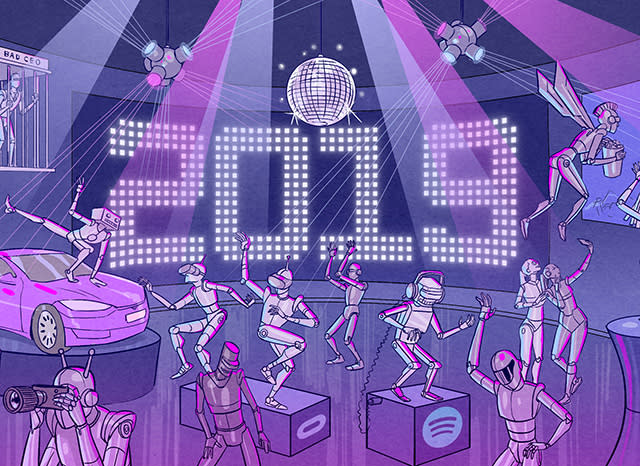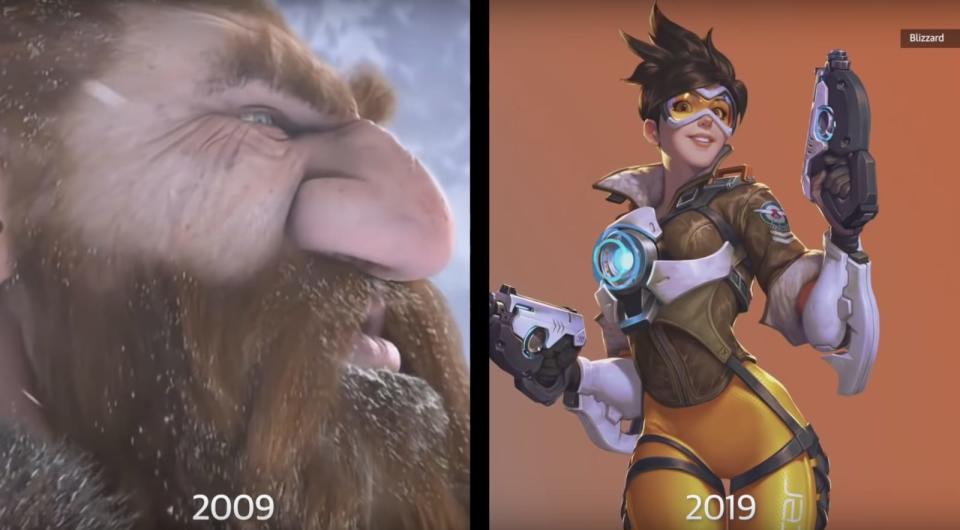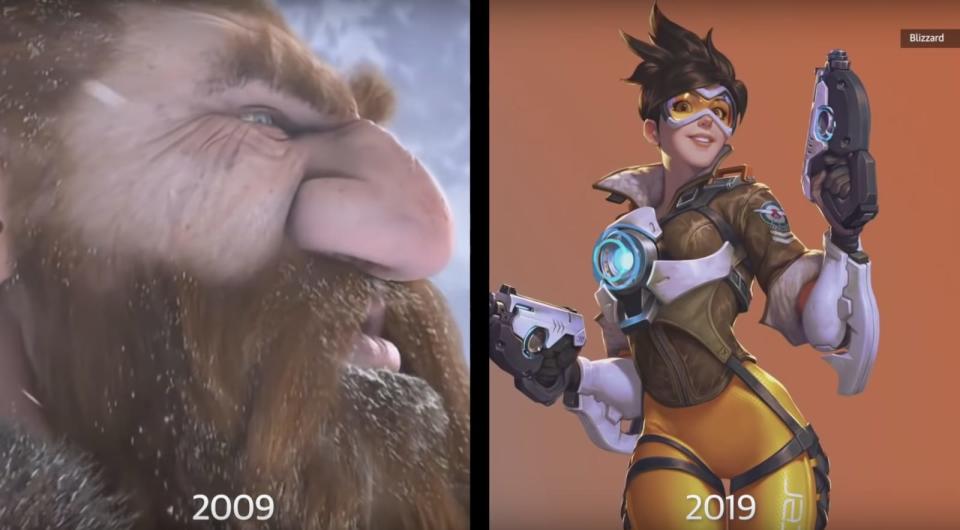The 10-year challenge: Video game edition
A look at the biggest gaming companies in 2009 and 2019.
The 10-year challenge swept social media in January, with people posting images of themselves from 2009 and 2019, usually accompanied by a cute remark about things being the same yet totally different. It's a fun, heartwarming way to train machine learning algorithms in facial recognition.
It's also not just for humans. Video game companies may not get crow's feet and white hair, but they age just the same. In 2009, Nintendo's Wii was handily outselling the Xbox 360 and PlayStation 3, Left 4 Dead 2 had just come out, and Best Music Game was a category at the Spike Video Game Awards. A decade later, the Nintendo Switch is outselling the Xbox One and PS4, Valve just revealed a new Half-Life game and Grimes shared the stage with CHVRCHES and Green Day at The Game Awards. Everything is the same; everything is different.
Video game companies have evolved alongside their customers, and the 10-year-challenge provides a clean opportunity to look back and compare where they've been with where they stand today. Welcome to #2009vs2019, the video game edition.
Microsoft
Top product in 2009: Xbox 360 Elite
Top product in 2019: Xbox One X
Progress report: As the two main console manufacturers, Microsoft and Sony have traditionally set the pace of evolution in the industry, but that's changing today with new cloud-gaming challengers, like Google. Microsoft is the only major video game name with the infrastructure to truly compete with Google in the streaming era, and the company is slowly, cautiously rolling out its own service, xCloud. While Google is already talking about 8K streams, Microsoft isn't overpromising anything, and this caution may stem from the rapid rise and fall of OnLive, which made its debut in 2009 and was effectively dead by 2012.
Back in 2009, Microsoft focused on hardware upgrades and accessories, like the Kinect motion-sensing camera. In 2019, software is king, and Microsoft offers a monthly game-download subscription service, plus it's purchased a slew of studios to create exclusive titles for the Xbox Series X, xCloud and beyond.
Sony
Top product in 2009: PlayStation 3 Slim
Top product in 2019: PlayStation 4 Pro
Progress report: Sony and Microsoft seem to alternate making huge marketing mistakes with new console releases, and at the start of the seventh console generation, it was Sony's turn. The PS3 was overpriced in many people's minds, and Sony played catch-up throughout the 2010s. The company redeemed its image with the smooth launch of the PS4, and it's been riding that wave for the past six years.
As Microsoft and Google battle to establish the foundation of cloud gaming, Sony is keeping things traditional, teasing a PS5 and shaking up its corporate structure ahead of a new generation. This doesn't mean Sony is completely resistant to change; it struck a (surprising) deal with Microsoft to use the company's Azure cloud technology in the future. Sony has been quieter than Microsoft throughout 2019, but that just means it's better poised to surprise in 2020.
Nintendo
Top product in 2009: Wii
Top product in 2019: Switch Lite
Progress report: In 2009, the Wii dominated the console market and changed the way people across the world interacted with video games. Today, the Switch and Switch Lite are on the same path, bridging the divide between living-room and mobile gaming. The House of Mario traditionally operates in its own universe, but that's changing just a little. Nintendo launched its first service for online gaming in late 2018, and it's been an early advocate of cross-console play, alongside Microsoft. Nintendo is still the home for strange and heartwarming gaming experiences with oddly restrictive policies, and it's heading into 2020 with a strong console release at its back.
The last time it was in this position, Nintendo launched the Wii U. I'll just leave it at that.
Activision Publishing
Top product in 2009: Call of Duty: Modern Warfare 2
Top product in 2019: Call of Duty: Modern Warfare
Progress report: No, that's not a typo. Activision may publish other games, but Call of Duty is the company's main money maker, and the franchise keeps on delivering, even when the naming structure gets confusing. Call of Duty consistently outsells the competition, and Activision has established a multi-studio development structure that keeps the games coming annually. Activision remains a major name in AAA gaming, but in the future, it's going mobile -- the smartphone version of Call of Duty came out in October and saw more than 100 million downloads in its first month.
Call of Duty: Mobile also represents Tencent's growing influence over the video game industry. Massive Chinese technology conglomerate Tencent has a 4.9 percent stake in Activision Blizzard, following the company's split from its former owner, Vivendi, in 2013. Tencent owns or has a stake in Epic Games, Riot Games, Ubisoft, Bluehole, Supercell, Grinding Gear Games and Paradox Interactive. China's video game market is nearly four times the size of the US audience, and partially due to a lack of Western consoles in the country, Chinese players are really into mobile gaming. Meanwhile, the Chinese government is really into censorship, and these partnerships have already resulted in a few troubling situations for Western studios.
Blizzard Entertainment
Top product in 2009: World of Warcraft
Top product in 2019: Overwatch
Progress report: Activision's partner in profit is Blizzard. World of Warcraft was Blizzard Entertainment's main concern in 2009, and 10 years later, it's Overwatch. Blizzard has been running PC-focused franchises, such as StarCraft and Diablo, for well over a decade, and it's now a hub for popular esports titles including Overwatch and Hearthstone. While World of Warcraft has lost a significant portion of its audience since 2009, Blizzard has picked up new players with friendly looking competitive games and flashy, story-driven YouTube animations. When all else fails, use the Pixar method.
Ubisoft
Top product in 2009: Assassin's Creed II
Top product in 2019: Far Cry: New Dawn
Progress report: Ubisoft's publishing business has shrunk significantly since the early 2010s, and instead of churning out Rabbids titles, licensed games and experiments like ZombiU, it's focusing on just a handful of important IPs. Even then, it's struggling -- Ubisoft just delayed basically every game on its 2020 roster after the poor reception of The Division 2 and Ghost Recon Breakpoint, this year. Personally, I miss weird, free-wheeling Ubisoft, though I'm happy to leave The Expendables 2: The Video Game in the past.
Electronic Arts
Top product in 2009: FIFA 09
Top product in 2019: FIFA 2019
Progress report: You know when someone posts a 10-year challenge and you can't tell which photo is supposed to be the new one? Yeah, that's EA. In late 2008, EA launched FIFA 09, and in 2019, it's all about FIFA 19 and FIFA 20. Or, replace "FIFA" with "Madden NFL," or "NHL" or basically any other athletic organization. EA Sports remains a crucial brand for EA, and the company's catalog hasn't changed much overall in the past decade. It still handles The Sims, Battlefield and the sprawling RPG franchises that spawn out of BioWare. Apex Legends, an online competitive shooter, represents EA's ability to adapt with the times. EA is publishing new, familiar titles while slowly evolving its online services. This business model isn't necessarily sexy, but it just might be sustainable.
Rockstar Games
Top product in 2009: Grand Theft Auto: The Ballad of Gay Tony
Top product in 2019: Red Dead Online
Progress report: There's a clear evolutionary line running through Rockstar's library over the past decade -- the company has cultivated its most important franchises and built online experiences that shine in the Twitch era. Grand Theft Auto Online kept Grand Theft Auto 5 at the top of the sales charts for years after its release, and Red Dead Online is off to a similarly strong start. GTA Online roleplaying is one of the biggest phenomenons to hit Twitch this year. Don't waste your time worrying about Rockstar in the next decade.
Epic Games
Top product in 2009: Unreal Engine
Top product in 2019: Fortnite
Progress report: Tag this one #GlowUp. Epic Games has seen plenty of success since Tim Sweeney founded it in 1991, but the company has rocketed to fame over the past few years, thanks to Fortnite. In 2009, Epic's major product was the Unreal Engine, and this remains a critical aspect of the company's operations, providing the backbone for a long list of games, including Star Wars Jedi: Fallen Order, PUBG, Soulcalibur 6 and Hellblade: Senua's Sacrifice.
But today, Epic is defined by Fortnite, the cartoonish battle royale masterpiece that's taken over the toy aisle at Target. It's also running the Epic Games Store in direct competition with Steam, making the PC-gaming space more exciting than it's been in... well, about 10 years.
Valve
Top product in 2009: Steam
Top product in 2019: Steam
Progress report: Even though Valve has released a handful of games and VR hardware in the past decade, Steam remains its main source of income -- and control. When Epic launched its own PC-gaming store and offered a better revenue-sharing deal to developers late last year, Valve barely blinked. It still hasn't changed Steam's business model. Valve also has a handful of legendary franchises at its disposal, including Half-Life, Portal, Team Fortress 2 and Left 4 Dead, and players have proven they'll wait decades for updates.
That's it for our stroll down memory (card) lane. Now, let's quickly flip the 10-year challenge on its head, and guess where gaming will be in 2029. A growing Chinese market and the accessibility of smartphones worldwide will drive a strong focus on mobile gaming, with less importance placed on actual consoles -- even if they're disguised as PCs. The back half of 2019 has been marked by a new advent of cloud gaming, and in ten years, it's fair to say the industry will likely be operating on a streaming-first basis.
Of course, back in 2009, people were saying the same thing about OnLive in 2019. Everything is the same, and everything is different.
ENGADGET'S YEAR IN REVIEW 2019




